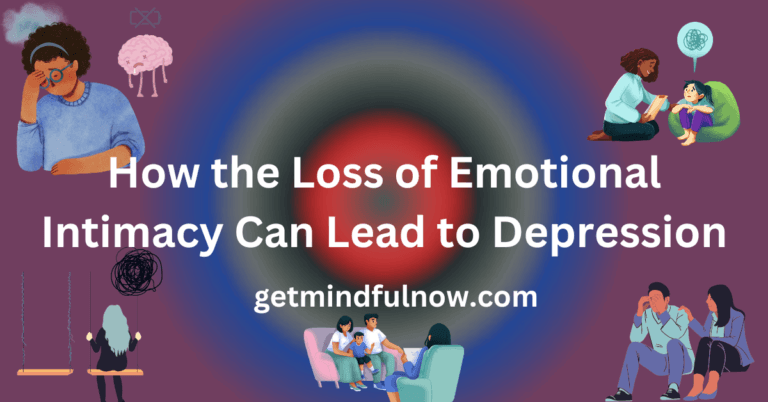Depression is a multifaceted mental health issue that has been extensively studied, yet its roots are often misunderstood. Among the various causes, one of the most significant yet overlooked factors is the loss of emotional intimacy. Emotional intimacy refers to a deep sense of closeness, connection, and vulnerability shared between individuals. When this bond is fractured or lost, it can lead to profound feelings of isolation, despair, and ultimately, depression.
In this article, we will explore how the absence of emotional intimacy contributes to depression, the impact it has on mental health, and the importance of fostering close, emotionally intimate relationships.
Understanding Emotional Intimacy
Emotional intimacy is the glue that holds meaningful relationships together. It goes beyond mere physical closeness or surface-level conversations, delving into the realm of deep emotional connection. When two people are emotionally intimate, they share their innermost thoughts, fears, and dreams with each other, creating a safe space where they can be their true selves.
Emotional intimacy involves vulnerability, trust, and mutual respect. It allows individuals to feel seen, heard, and understood, which are fundamental human needs. When these needs are met, they provide a sense of security and belonging. However, when emotional intimacy is lacking or lost, it can leave individuals feeling isolated, misunderstood, and unsupported.
Sarah and Alex have been dating for three years. They have a healthy, supportive relationship built on mutual respect and trust.
Scenario: After a long day at work, Sarah comes home feeling stressed and overwhelmed. She has been dealing with a difficult situation at work and hasn’t talked to anyone about it yet. When she walks through the door, Alex notices that something is off. He gently asks her if she’s okay.
Sarah takes a deep breath and decides to open up. She tells Alex about the situation, her worries, and how it’s been affecting her. As she speaks, Alex listens attentively, maintaining eye contact and occasionally nodding to show he’s engaged. He doesn’t interrupt or offer solutions right away; instead, he lets her get everything out.
When Sarah finishes, Alex thanks her for sharing and acknowledges how hard it must have been for her to carry this burden alone. He expresses his support, saying, “I’m here for you, no matter what. We’ll get through this together.” He then offers to help her brainstorm some potential solutions or simply be a sounding board for her ideas. They decide to cook dinner together, enjoying each other’s company and making a plan for the next steps.
Key Elements of Emotional Intimacy:
- Active Listening: Alex fully listens to Sarah’s concerns without interrupting.
- Empathy: He tries to understand her feelings and offers support.
- Vulnerability: Sarah feels safe to express her deepest concerns, knowing Alex will respond with kindness and understanding.
- Support: Alex offers his support and reassures Sarah that they are in this together.
Mike and James have been best friends since college. They’ve supported each other through various life changes and challenges.
Scenario: James has recently gone through a tough breakup. He’s been feeling down and hasn’t talked much to anyone about how he’s feeling. One evening, Mike invites James over for a casual night in. As they settle on the couch with some snacks, Mike notices James seems quieter than usual.
Mike gently asks, “How are you holding up, man? I know it’s been rough lately.” James hesitates at first but then begins to talk about his feelings of sadness, loneliness, and fear about the future. Mike listens carefully, giving James his full attention and occasionally offering words of encouragement or understanding.
When James finishes, Mike says, “It’s completely okay to feel this way. Breakups are hard, and it’s normal to feel lost for a while. Just know that I’m here for you, and we can hang out and do whatever you need to feel better.” Mike suggests they could go on a hike or hit the gym together, knowing physical activity helps James feel better. James feels relieved and grateful for Mike’s support and friendship.
Key Elements of Emotional Intimacy:
- Safe Space: Mike creates a safe environment for James to share his feelings.
- Understanding and Validation: Mike validates James’s feelings and reassures him that it’s okay to feel the way he does.
- Companionship: Mike offers to spend time together and participate in activities that might help James feel better.
- Trust: James trusts Mike enough to share his vulnerable feelings, knowing Mike will respect and support him.
The Connection Between Emotional Intimacy and Mental Health
Emotional intimacy plays a crucial role in mental health. Human beings are inherently social creatures, and our emotional well-being is deeply tied to the quality of our relationships. When we feel emotionally connected to others, our stress levels decrease, and we experience a sense of comfort and stability.
Conversely, the loss of emotional intimacy can lead to feelings of loneliness and abandonment. Over time, these feelings can escalate, causing emotional distress that manifests as depression. The absence of emotional support can make it difficult for individuals to cope with life’s challenges, leading to a downward spiral of negative emotions.
When you have someone you can be open with, who truly understands and accepts you, it’s easier to face life’s challenges. Imagine coming home after a tough day at work; you’re exhausted and frustrated. You vent to your partner or a close friend, and they listen without judgment, offering comfort and understanding. This simple act of sharing your burdens can significantly reduce stress and anxiety, making you feel less alone in your struggles.
On the flip side, think of someone who doesn’t feel understood by their partner. They might start to internalize their emotions, leading to increased stress and potential mental health issues.
How Loss of Emotional Intimacy Leads to Depression
The loss of emotional intimacy can be gradual or sudden, but the impact is often the same—a deep sense of grief and loneliness. Here’s how this loss can lead to depression:
Isolation
Without emotional intimacy, individuals may feel isolated, even in the presence of others. This sense of disconnection can lead to a lack of motivation to engage in social activities, further deepening the isolation.
Increased Stress
Emotional intimacy acts as a buffer against stress. When this buffer is removed, individuals may find it harder to manage stress, leading to anxiety and depressive symptoms.
Lower Self-Esteem
Emotional intimacy often reinforces a person’s sense of self-worth. When this is lost, individuals may struggle with feelings of inadequacy and low self-esteem, both of which are closely linked to depression.
Hopelessness
The loss of emotional intimacy can lead to a sense of hopelessness, where individuals feel that they have no one to turn to for support. This can exacerbate feelings of despair and contribute to the onset of depression.
I believe Humans are biologically wired for deep emotional connections with others. When we lose this connection, our brains perceive it as a threat, triggering a fight-or-flight response. This ancient survival mechanism, governed by the amygdala and sympathetic nervous system, is designed to protect us from danger by increasing our alertness and readiness to act. However, in the context of a lost emotional bond, this response can have detrimental effects on our mental and physical health.
The loss of emotional intimacy is so profound that it can affect basic functions like hunger and sleep, as the body prioritizes survival over these needs. This can lead to a state of chronic stress, where the body remains in a prolonged freeze or “shut down” state. Constantly cycling through thoughts of the lost connection and feelings of helplessness, we become trapped in a downward spiral that negatively impacts our well-being. Over time, this can lead to various mental and physical health issues, such as depression, anxiety, and weakened immune function. It is essential to recognize the importance of nurturing and maintaining emotional connections for our overall health and well-being.
Emotional Intimacy in Romantic Relationships
Romantic relationships are often the most intense and emotionally charged connections we form. In these relationships, emotional intimacy is vital for maintaining a strong and healthy bond. However, when emotional intimacy fades, it can lead to dissatisfaction, resentment, and ultimately, depression.
In many cases, the loss of emotional intimacy in romantic relationships stems from communication breakdowns, unmet emotional needs, or unresolved conflicts. Over time, these issues can erode the foundation of the relationship, leaving both partners feeling disconnected and unsupported.
Imagine a couple, Emily and Jake. They have always shared a deep emotional connection, where they feel safe to express their thoughts and emotions without judgment. When Emily faces the sudden loss of a job she loved, she finds comfort in sharing her fears and frustrations with Jake. Instead of trying to fix the situation immediately, Jake listens attentively and offers empathy and reassurance. This emotional intimacy allows Emily to process her emotions in a healthy way, strengthening their bond and helping her to cope with the stress.
In today’s culture of hyper-independence, people often prioritize self-sufficiency and toughness over vulnerability and connection. This mindset can be toxic, as it discourages people from relying on others for emotional support, leading to isolation and loneliness.
While being independent is important, completely shutting out emotional intimacy can deprive individuals of the warmth and understanding that come from sharing life’s ups and downs with someone else. Ultimately, fostering emotional intimacy in romantic relationships isn’t a sign of weakness; it’s a powerful way to build resilience and nurture a fulfilling partnership.
The Role of Emotional Intimacy in Friendships
Friendships also thrive on emotional intimacy. True friends share their lives with each other, providing mutual support through both good times and bad. When emotional intimacy is present in a friendship, it can serve as a powerful protective factor against depression.
However, when emotional intimacy is lost in a friendship—whether due to distance, misunderstandings, or life changes—it can lead to feelings of loneliness and disconnection. This loss can be particularly painful because friends often serve as a primary source of emotional support outside of romantic relationships.
Emma and Zoe have been best friends since high school. Recently, Emma went through a difficult breakup, and while she tried to put on a brave face, she was really struggling internally. One evening, Zoe noticed that Emma hadn’t been her usual cheerful self. Instead of waiting for Emma to open up, Zoe took the initiative to invite her over for a girls’ night.
As they sat on the couch, Zoe gently asked Emma how she was really feeling about the breakup. At first, Emma hesitated, worried about seeming weak or burdensome. But Zoe’s genuine concern and lack of judgment made her feel safe to open up. Emma began to share her feelings of heartbreak and self-doubt, things she hadn’t even admitted to herself yet.
Zoe listened without interrupting and offered understanding and empathy. She didn’t try to minimize Emma’s feelings or offer clichéd advice. Instead, she validated Emma’s emotions and reminded her of her worth. Over the next few weeks, Zoe continued to check in, offering both a listening ear and a shoulder to cry on whenever Emma needed it.
Significance of Emotional Intimacy:
Zoe’s ability to create a safe and supportive space for Emma to express her emotions played a crucial role in Emma’s healing process. Emotional intimacy allows friends to connect on a deeper level, providing the comfort and understanding needed to navigate life’s challenges. By being there for each other in vulnerable moments, friends like Zoe and Emma can strengthen their bond and enhance their emotional well-being.
Rebuilding Emotional Intimacy
The good news is that emotional intimacy can be rebuilt, even after it has been lost. Rebuilding emotional intimacy requires effort, communication, and a willingness to be vulnerable. Here are some steps to help rekindle emotional intimacy:
Open Communication: Start by having an open and honest conversation about your feelings. Share your concerns and listen to the other person’s perspective.
Quality Time: Spend quality time together without distractions. Focus on activities that foster connection, such as deep conversations, shared hobbies, or simply being present with each other.
Express Gratitude: Regularly express appreciation for the other person. This helps to reinforce positive feelings and rebuild trust.
Seek Professional Help: If the loss of emotional intimacy has led to significant issues, consider seeking the help of a therapist or counselor who can guide you through the process of rebuilding your connection.
Meet David
David was a vibrant and outgoing person in his early thirties, known among his friends for his infectious laugh and positive energy. However, after the breakdown of his eight-year-long relationship, he found himself spiraling into a deep depression. The loss of emotional intimacy with his partner left him feeling isolated and misunderstood, despite being surrounded by friends and family.
The Turning Point
David realized he needed help when his usual hobbies and social interactions no longer brought him joy. He was plagued by feelings of emptiness and a constant state of fatigue. Desperate for change, he reached out to me for professional guidance.
The Journey to Recovery
During our initial sessions, we explored the root of David’s depression. He was suffering from the profound loss of the emotional connection he once shared with his partner. I explained to David that emotional intimacy is a fundamental human need and that its absence can trigger a fight-or-flight response, leading to feelings of anxiety, loneliness, and depression.
We started by focusing on small, practical steps to rebuild his emotional resilience and reconnect with his inner self:
Creating a Safe Space: We established a non-judgmental space where David could freely express his thoughts and emotions. This allowed him to unpack the layers of grief, anger, and confusion he had been carrying.
Mindfulness and Self-Compassion: I introduced David to mindfulness practices and encouraged him to engage in daily self-reflection exercises. By learning to be present with his emotions and practicing self-compassion, he began to break free from the negative thought patterns that fueled his depression.
Reconnecting with Passions: Together, we identified activities and hobbies that David used to love but had abandoned. Gradually, he reintroduced these into his life, starting with small steps like painting and hiking, which helped him rediscover his sense of joy and purpose.
Building New Emotional Connections: Recognizing the importance of emotional intimacy, we worked on strategies to cultivate meaningful relationships. David started opening up more to his friends and family, allowing himself to be vulnerable and authentic. He also joined a local book club, where he met people who shared his interests.
Regular Check-ins: We scheduled regular sessions to monitor David’s progress, address any setbacks, and reinforce positive changes. These sessions provided him with a consistent support system and helped him stay accountable to his personal growth journey.
The Transformation
Over the course of several months, David experienced a significant transformation. He began to feel more connected to himself and others, and the heavy cloud of depression started to lift. By actively participating in his recovery and embracing the tools and techniques we worked on together, David rebuilt his emotional resilience and found a renewed sense of purpose.
The Outcome
Today, David is thriving. He maintains a healthy balance of independence and emotional connection with others. He continues to practice mindfulness and self-compassion, which have become integral parts of his daily routine. David’s journey is a testament to the power of rebuilding emotional intimacy and the positive impact it can have on one’s mental health and overall well-being.
The Impact of Technology on Emotional Intimacy
As a psychologist, I’ve observed that technology has a profound impact on emotional intimacy in both personal relationships and society. While it can facilitate communication, it can also hinder emotional intimacy. Social media, texting, and other forms of digital communication can create a false sense of connection, where interactions are shallow and lacking in emotional depth.
Moreover, the constant distractions of technology can prevent us from being fully present with others, leading to a decline in emotional intimacy. It’s important to recognize when technology is interfering with our relationships and take steps to prioritize face-to-face interactions and meaningful conversations.
Coping with the Loss of Emotional Intimacy
Coping with the loss of emotional intimacy can be challenging, but it’s essential for preventing depression. Here are some strategies to help cope with this loss:
Professional Support: Don’t hesitate to seek professional help if you’re struggling to cope with the loss of emotional intimacy. A therapist can provide valuable support and guidance.
Focus on Self-Care: Prioritize self-care activities that nurture your mental and emotional well-being. This might include exercise, mindfulness practices, or engaging in hobbies that bring you joy.
Allow Yourself to Feel: Acknowledge and express your emotions fully rather than repressing them. Suppressing feelings or forcing yourself to “do well” after a loss can lead to disconnection from yourself.
Honor the Grieving Process: Don’t rush to move on quickly. Understand that the grieving period is essential for cleansing old energy and healing. It’s a necessary phase for personal growth and recovery.
Recognize Emotional Connection as a Basic Need: Accept that the need for emotional belonging is as crucial to your well-being as eating and exercising. Prioritize building and maintaining meaningful connections.
Accept the Freeze Response: Understand that a freeze response to the loss of emotional intimacy is normal and part of the human experience. Don’t label yourself as clinically depressed or abnormal—this response is a natural part of coping, not a disorder.
Preventing the Loss of Emotional Intimacy
Preventing the loss of emotional intimacy requires ongoing effort and attention. Here are some tips to help maintain emotional closeness in your relationships:
Prioritize Emotional Connection: Make emotional intimacy a priority in your relationships by regularly checking in with your loved ones and engaging in meaningful conversations.
Resolve Conflicts Early: Address conflicts as they arise rather than letting them fester. Unresolved conflicts can erode emotional intimacy over time.
Be Vulnerable: Foster emotional intimacy by being open and vulnerable with others. Share your feelings, fears, and desires, and encourage the other person to do the same.
Show Appreciation: Regularly express gratitude and appreciation for the people in your life. This helps to strengthen emotional bonds and maintain intimacy.
Conclusion
Emotional intimacy is a cornerstone of healthy relationships and mental well-being. Its loss can have profound effects, leading to feelings of isolation, stress, and ultimately, depression. However, by understanding the importance of emotional intimacy and taking steps to rebuild and maintain it, we can protect our mental health and nurture deeper, more fulfilling relationships.
Frequently Asked Questions
How can I tell if emotional intimacy is lacking in my relationship?
Emotional intimacy is lacking if you feel distant from the other person, struggle to communicate openly, or feel unsupported emotionally. If your conversations have become superficial or you avoid discussing deeper topics, this could be a sign that emotional intimacy is fading.
Can the loss of emotional intimacy in a relationship be repaired?
Yes, the loss of emotional intimacy can be repaired with effort and commitment from both parties. Open communication, quality time together, and a willingness to be vulnerable are key steps in rebuilding emotional intimacy.
What role does trust play in emotional intimacy?
Trust is foundational to emotional intimacy. Without trust, individuals are less likely to open up and share their true feelings. Building and maintaining trust is essential for fostering emotional closeness.
How does emotional intimacy differ from physical intimacy?
Emotional intimacy involves a deep connection on an emotional level, where individuals share their innermost thoughts and feelings. Physical intimacy, on the other hand, involves physical closeness and touch. While the two can be connected, emotional intimacy is about connecting emotionally, not just physically.
Is it possible to have emotional intimacy without a romantic relationship?
Absolutely. Emotional intimacy can be present in friendships, family relationships, and other close connections. It is not limited to romantic relationships and can be just as fulfilling in other contexts.
What are some common barriers to emotional intimacy?
Common barriers include fear of vulnerability, past traumas, poor communication skills, and unresolved conflicts. Addressing these issues is crucial for developing and maintaining emotional intimacy.








